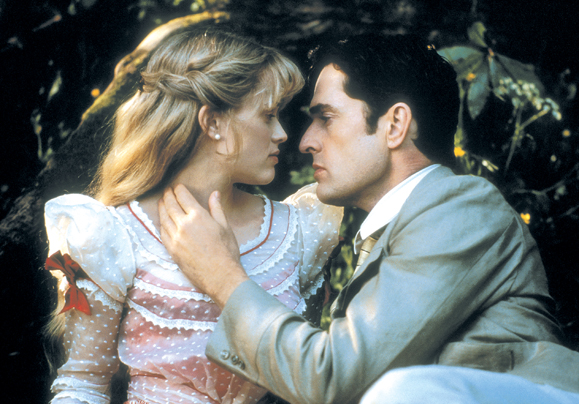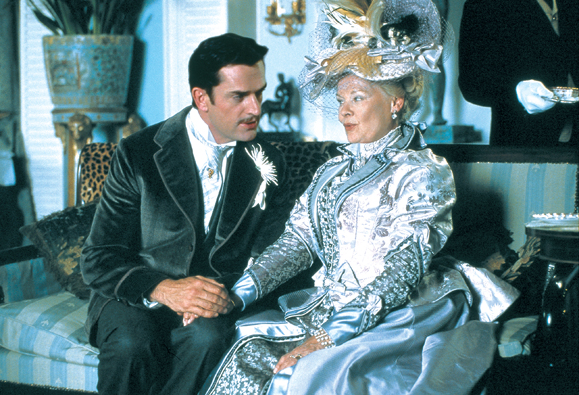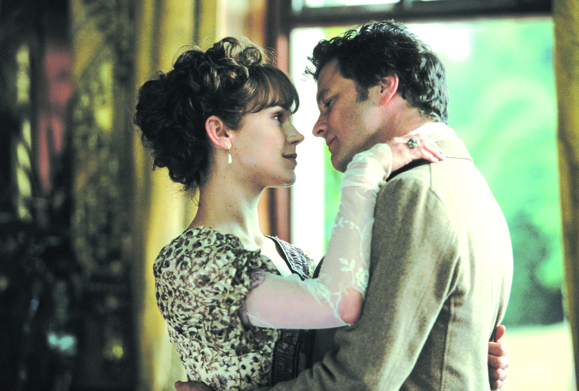Hyping up Wilde in Earnest won’t win Parker and Oscars.
“Life is too important to be taken seriously,” Oscar Wilde observed. He demonstrated that principle most dazzlingly in The Importance of Being Earnest, his 1895 play satirizing, among other things, the uselessness of British upper-class twits, the hypocrisy of would-be moral arbiters, the shallowness of social standing, the absurdities of aristocratic lineage, the sentimental cliches of foundling tales, and the frantic games played by romantic heterosexuals. With his love for the paradoxical epigram, Wilde gave his most celebrated play the subtitle “A Trivial Comedy for Serious People.”
Like fellow Irish playwright George Bernard Shaw, Wilde was a masterful dissector of the pathologies of the British class system. The outsider, a role Wilde instinctively played in every aspect of his life, can best perceive the foibles of the group whose fringes he tenuously inhabits. What keeps Earnest alive as more than a museum piece is its affectionate but clear-eyed understanding of the vagaries of human emotion and behavior, its embrace of characters whose blinkered humanity keeps them more rounded than their constricted social milieu. They may be Victorians but they are also Wildeans, creatures whose wit and spirit arise from their sublimely conflicted emotional imperatives.
Now that Jane Austen’s oeuvre has been virtually exhausted by film-makers, there are signs that Wilde is becoming the new Jane Austen. In recent years we’ve seen film versions of An Ideal Husband and The Picture of Dorian Gray as well as a fourth Wilde biopic, Wilde, based on Richard Ellmann’s magisterial biography and starting Stephen Fry (earlier, Wilde was played on screen by Peter Finch, Robert Morley, and Michael Gambon). A few years before the recent revival of interest in Wilde, we were given the marvelous Irish film A Man of No Importance, with Albert Finney playing a gay Dublin bus driver obsessed with staging Wilde’s Salomé, the play that inspired Ken Russell’s 1988 Salomé’s Last Dance.
Like Austen, Wilde is an ideal writer for the contemporary directors to work with because he isn’t around to demand payment for the film rights to his work or to object to wholesale changes in it. In another sense, however, Wilde and Austen are anomalies in the contemporary marketplace, for they appeal to the dwindling number of spectators who still revel in the beauty of words.
In an increasingly subverbal or, to put it more charitably, post-verbal film world, the old distinctions between “high” and “low” culture, which had become increasingly blurred as the “film generation” discovered the seemingly infinite possibilities of the medium, have returned with a vengeance. Films drawn from Wilde and Austen cater to a niche audience that has little in common with the audience flocking to the latest mayhemfilled blockbuster or moronic gross-out comedy.
British writer-director Oliver Parker, who also made the 1999 film of An Ideal Husband, now assembles another splendid cast for The Importance of Being Earnest, headed by Rupert Everett (Lord Arthur Goring in Husband) as the decadent ne’er-do-well Algernon Moncrieff, and Colin Firth as his socially anxious friend Jack Worthing. Made in England for Ealing Studios and the American-based Miramax Films, Earnest remains in its Victorian time period, with smart production design by Luciana Arrighi and costuming by Maurizio Millenotti. But it takes some dubious liberties with Wilde in misguidedly attempting to appeal to the lower instincts of contemporary audiences.

Some of Parker’s alterations work well enough. The extended discussions in the first act between Algernon and Jack, which Wilde sets in Algy’s flat in Half-Moon Street, are smoothly re-distributed by Parker and film editor Guy Bensley into various settings, including a music hall, a gambling parlor-cum-brothel, and darkened London streets. Another fitting musical interpolation in the film has the boys singing a Wilde song, “Lady Come Down.”
But the pacing of scenes often seems uncertain and the dialogue is sometimes not swift enough for the demanding purposes of farce. In general, the film’s level of performance is much higher than the level of directing, which oscillates in various scenes from being overly fragmented to being overly static. The choppy construction gives the impression of clumsy attempts to cover botched execution.
Some of the actors seem stranded by the director, notably the usually solid Tom Wilkinson, who plays the Rev. Canon Chasuble in too dithering a fashion (Wilkinson was the Marquess of Queensberry in Wilde). Chasuble’s courting of the elderly governess, Miss Prism (Anna Massey), is clumsily staged rather than expressive of the couple’s clumsiness, but Massey nevertheless gives a haunting performance.
Most regrettable are some rather bizarre interpolations unnecessarily spelling out subtexts, such as a running gag about Gwendolen (Frances O’Connor) having her lover’s name tattooed on her bum as she talks in voiceover of her “exquisitely painful” feelings for Jack. There’s a tedious series of overripe, crushingly literal fantasy images of Cecily (Reese Witherspoon) imagining Algy as her knight in shining armor. These witless touches are unworthy of Wilde’s epigrammatical style, and suggest that the film-maker doesn’t entirely trust the quality of the play’s dialogue to carry the day.
More adroitly, Parker tosses in a prankish funeral, seen briefly in the end-credits sequence, for the non-existent “Bunbury,” the two young men’s all-encompassing excuse for ducking social obligations. Parker’s best notion is a flashback revealing the music-hall origins of the snobbish Lady Bracknell (Judi Dench). With the younger lord and lady Bracknell played by film editor Bensley and Finty Williams, the gag has the rapier-sharp thrust of a Wilde epigram.
On the other hand, some of Wilde’s most amusing epigrams are truncated and perversely reduced to prosaic, unremarkable utterances. In the play when Algernon asks to look at Cecily’s diary, she refuses, explaining, “You see, it is simply a very young girl’s record of her own thoughts and impressions, and consequently meant for publication.” For some unfathomable reason, Parker has eliminated the part about the diary being meant for publication, as well as Cecily’s next line, “When it appears in volume form I hope you will order a copy.” The cuts have eliminated what made the exchange amusing in the first place.
And while Gwendolen still tells Jack, “We live, as I hope you know, Mr. Worthing, in an age of ideals,” she no longer adds, “The fact is constantly mentioned in the more expensive monthly magazines, and has reached the provincial pulpits I am told.”

Dench, who has played Lady Bracknell on stage and exudes an air of royalty reminiscent of her Queen Victoria in Mrs. Brown, fares best among the cast. Her scenes are precisely controlled and phrased with impeccable wit. The film’s best scene is her extended, coolly sadistic interview with the agitated Jack over his lack of suitability, in her eyes, as a marriage partner for Gwendolen.
But it seems that Parker just can’t help getting in the way of the language. The Worthing country estate is a spectacular site, irresistible to a filmmaker, perhaps, but far too grand to suit Jack’s minor level of aristocracy. In rather too extreme contrast, Parker heightens Algy’s degree of insolvency, starting the film with him running from his creditors. Another added scene showing a creditor threatening Algy with arrest is not funny enough to rescue it from seeming gratuitously melodramatic.
Wilde’s world is long vanished and with it, perhaps, the aplomb necessary for creating a true cinematic equivalent of his style. Ironically, the finest transferral of a Wilde play to the screen came in 1925, when the great director Ernst Lubitsch, known for the visual wit of his “Lubitsch touches,” made Lady Windermere’s Fan with Ronald Colman and May McAvoy. No other Wilde adaptation has better captured the spirit of his work – and it’s a silent movie. ♦


Leave a Reply